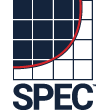New SPEC benchmark measures enterprise JMS server performance
WARRENTON, Va., October 25, 2007 – The Standard
Performance Evaluation Corp. (SPEC) today released SPECjms2007,
a new benchmark that measures the performance of enterprise
message-oriented middleware servers. The benchmark uses
the JMS (Java Message Service) standard interface supported
by all major enterprise messaging vendors.
Message-oriented middleware is at the core of a vast number
of financial services and telecommunications applications.
It is also gaining traction in industries such as manufacturing,
transportation, healthcare and supply chain management.
SPECjms2007 is the first industry-standard benchmark designed
specifically for enterprise messaging servers based on
JMS. It provides a consistent workload and performance
metrics for competitive product comparisons, as well
as a framework for indepth performance analysis of enterprise
JMS messaging.
SPECjms2007 was developed by SPEC’s Java subcommittee,
with contributions from Technische Universität Darmstadt,
IBM, Sun, Oracle, BEA, Sybase and Apache.
“This new benchmark provides a much-needed capability
for organizations seeking to optimize their enterprise
JMS messaging infrastructure,” says Ricardo Morin, chair
of SPEC’s Java subcommittee. “Thanks to all those who
contributed, especially Technische Universität Darmstadt,
which led this effort over the past two years.”
Benchmark overview
The SPECjms2007 benchmark uses a real-world, event-driven
application scenario that emulates a supermarket supply
chain in which the flow of goods is tracked using state-ofthe-
art RFID technology. The scenario involves the supermarket
company and its stores, distribution centers and suppliers.
Interactions within the scenario stress different subsets
of the functionality offered by messaging servers, including
point-to-point and publish/subscribe communication.
The SPECjms2007 workload can be structured using three
different topologies: horizontal, vertical and freeform.
The horizontal topology exercises the ability of the server
to handle increasing message traffic by scaling the number
of destinations while keeping the traffic per destination
constant. The vertical topology exercises the ability
of the server to handle increasing message traffic by
scaling the rate at which messages are injected through
a fixed set of destinations. These two topologies are
used for official SPEC benchmark results.
The free-form topology allows users to construct their
own workload using SPECjms2007 components as building
blocks. The benchmark provides flexibility in customizing
the workload, making it an ideal tool for in-depth performance
analysis of the JMS server in specific areas of interest.
SPECjms2007 measures the end-to-end performance of all
components that make up the application environment,
including hardware, JMS server software, JVM software,
database software if used for message persistence, and
the system network.
The benchmark provides two metrics, SPECjms2007@Horizontal
for the horizontal topology and SPECjms2007@Vertical
for the vertical topology. Since SPECjms2007 results
are based on a unique workload, they cannot be compared
to any other benchmark results. SPEC requires that any
public reporting of results from the SPECjms2007 benchmark
follow its fair use rules, available at www.spec.org/osg/fair_use-policy.html.
Available immediately
SPECjms2007 is available immediately from SPEC for $1,800;
qualified non-profit and educational institutions can
purchase the benchmark for $450. More information is
available at www.spec.org/jms2007 or through e-mail at
info@spec.org .
About SPEC
SPEC (www.spec.org)
is a non-profit organization that establishes, maintains
and endorses standardized benchmarks to measure the performance
of the newest generation of high-performance computers. Its
membership comprises leading computer hardware and software
vendors, universities, and research organizations worldwide. For
more information, contact Dianne Rice, SPEC, 6585 Merchant
Place, Ste. 100, Warrenton, VA 20187, USA; phone: 540-349-7878;
fax: 540-349-5992; e-mail: info@spec.org; web: www.spec.org.
###
Media contact: Bob
Cramblitt
Cramblitt & Company
919-481-4599;
info@cramco.com
Product and service names mentioned herein may be the
trademarks of their respective owners.




